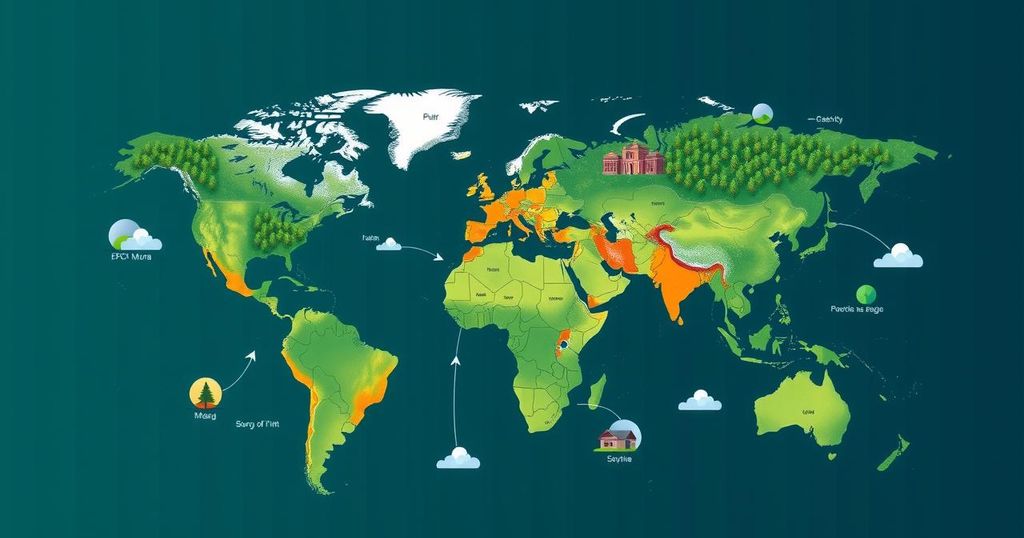Global organizations are sounding alarms about the climate crisis ahead of COP29 in Baku. Record levels of greenhouse gases have been reported, correlating with increasing global temperatures and severe weather events. The need for coordinated international action and ambitious climate goals has never been more urgent, as countries prepare to submit new contribution targets by 2025.
The climate crisis continues to escalate, prompting urgent calls for global cooperation among nations. This was underscored by recent reports from the World Meteorological Organization (WMO) and the United Nations Environment Programme (UNEP), in light of the 29th Conference of the Parties on Climate Change (COP29) taking place in Baku, Azerbaijan from November 11-22. Reports highlight an alarming rise in greenhouse gas emissions, with CO2 levels reaching unprecedented highs, significantly impacting temperature stability on Earth.
The latest WMO bulletin indicates that greenhouse gas concentrations have reached record levels, marking a 151 percent increase in CO2, 265 percent in methane, and 125 percent in nitrous oxide compared to pre-industrial levels. WMO Secretary-General Celeste Saulo emphasized the importance of these statistics, noting, “This should set alarm bells ringing among decision-makers. These are more than just statistics. Every part per million and every fraction of a degree temperature increase has a real impact on our lives and our planet.”
Additionally, a study by the World Weather Attribution points to the dire consequences of climate change, with the ten most serious meteorological disasters since 2004 directly linked to global warming. Recent catastrophic flooding in Spain serves as a poignant example of how severe weather events are increasingly attributable to climate change, as evidenced by the assessment of hydrology expert Jesse Neumann.
In accordance with the Paris Agreement, nations are encouraged to establish robust and ambitious nationally determined contribution (NDC) targets by 2025. The 2024 UNEP Emissions Gap Report highlights the necessity of strengthening these commitments at COP29, warning that failure to do so could lead to a global temperature increase of 2.6-3.1 degrees Celsius, severely affecting economies and ecosystems worldwide.
As the next critical phase in climate action approaches, UNEP Executive Director Inger Andersen urged unprecedented global collaboration and stronger NDC targets to limit warming to 1.5 degrees Celsius. In this regard, China has actively formulated its climate policies, including the launch of its Action Plan on Early Warning for Climate Change Adaptation (2025-2027) during COP29, highlighting the need for improved global risk assessment and climate adaptation capacities.
Moreover, China’s climate envoy, Liu Zhenmin, underscored the country’s commitment to controlling emissions from methane and other pollutants, pressing for constructive dialogue with the United States to enhance cooperative efforts against climate change. UN climate chief Simon Stiell also pointed out the significance of establishing an ambitious climate finance target to ensure the welfare of all nations at COP29, emphasizing inclusivity for both wealthy and developing countries.
The ongoing climate crisis necessitates global engagement and action to mitigate its effects. Organizations like the WMO and UNEP have played pivotal roles in raising awareness about escalating greenhouse gas emissions and their consequential impacts on global temperatures. This climate summit, COP29, represents a crucial platform for countries to reassess their climate goals and commitments, fostering unity in the fight against climate change.
The urgency of addressing climate change is more pronounced than ever, as indicated by record levels of greenhouse gases and the direct correlation with destructive weather phenomena. Global forums such as COP29 are critical for nations to recommit to ambitious climate targets and collaborate effectively to prevent catastrophic temperature rises. With China and other nations actively pursuing climate initiatives, the path forward relies on collective effort and decisive action from all stakeholders involved.
Original Source: www.stdaily.com






